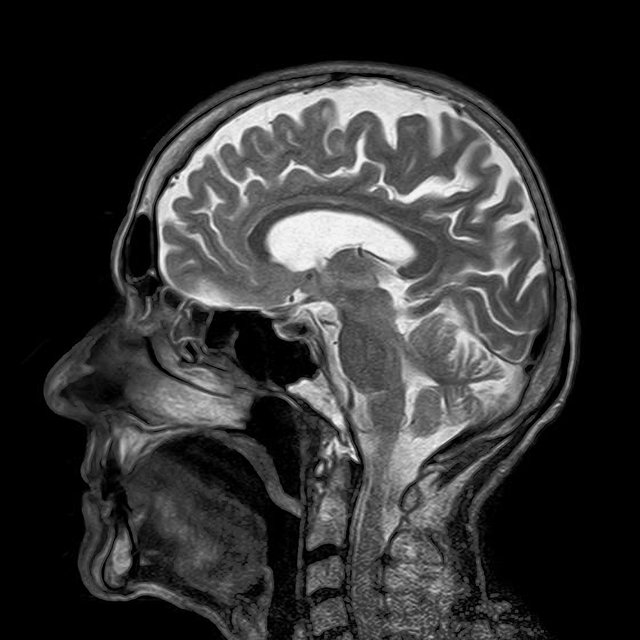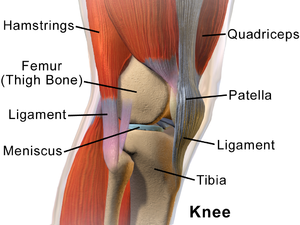Insomnia in focus [The most common sleeping disorder in humans]
Introduction
 MRI X-ray of the brain [License: CC0 Creative Commons]:
pixabay
MRI X-ray of the brain [License: CC0 Creative Commons]:
pixabay Struggling to sleep or waking up in the middle of the night and finding it hard to go back to bed, are issues that has been experienced by almost everyone at some point in our lives. For cases of insomnia, this default seems to repeat itself night after night (at least thrice a week)
Insomnia doesn't just affect our quantity of sleep, it also affects our quality of sleep. This makes it difficult for people with insomnia to attain the standard restorative level of sleep. This often leads to individuals falling asleep when they aren't supposed to, like during the day. Daytime fatigue is also a major problem. If allowed to persist, insomnia can cause feelings of irritability, depression, etc. This has contributed immensely to the number of accidents casused by drivers sleeping on the wheel during the day, after losing sleep at night.
According to the American academy of sleep medicine, 10% of adults suffer from chronic (long term) insomnia, while around 15-35% of adults suffer from acute (short term) insomnia, which lasts for just few days. This is quite problematic, especially from an elevated view, looking at how important having a good sleep influences our general health.
Biological factors influencing insomnia
 Chemical structure of cortisone, Author - Edgar181 [License: CC BY-SA 3.0]:
Wikimedia commons
Chemical structure of cortisone, Author - Edgar181 [License: CC BY-SA 3.0]:
Wikimedia commons At the top our list, is a hormone called cortisone. According to recent studies, its been observed that, individuals suffering from insomnia, might have an increased level of this stress hormone called cortisone. Cortisone is one of those important hormones that play a vital role in waking us up every morning.
Most physicians often prescribe cortisone shots to treat certain illnesses like osteoarthritis, bursitis, inflamed injuries in the joint. Insomnia happens to be a side effect of having cortisone as part of your treatment. There are other ways to lessen the risk of insomnia after taking a cortisone shot, including - getting your cortisone shots early enough, keep a proper bedtime routine, practice some relaxation techniques like meditation, etc. If insomnia persists, talk to a doctor.
What are the types of insomnia
There are basically two types of insomnia, including primary and secondary insomnia. There are insomnia conditions where an individuals sleeping disorder (insomnia) is not associated with other health issues, such cases are referred to as primary insomnia. There are also cases of insomnia where the sleeping disorder is caused by other health conditions like, anxiety, asthma, depression, arthritis, etc. Such cases are referred to as secondary insomnia. Secondary insomnia could also be sleeplessness caused by substance abuse like alcohol, pain, or some sort of medication affecting sleep.
Besides primary and secondary insomnia, there are other ways to describe insomnia, including..
Acute insomnia
This kind of insomnia often lasts for less than a month. Acute insomnia is often caused by a sudden negative change in a person's life, such as a sudden bad news in an individuals work place or other aspects of life. Traveling is another cause. Most times, this kind of insomnia resolves on its own, without any form of treatment, since it wasn't caused by a persistent bad habit or substance abuse.
Chronic insomnia
Just as the name implies, chronic insomnia is characterized by difficulty in sleeping on a long term basis. Insomnia is also described as chronic if an individual finds it hard to sleep or stay asleep for at least there nights per week in 3months or over. There are many causes of chronic insomnia
Cormorbid insomnia
There are certain insomnia cases which occurs along side other conditions. Some psychiatric disorders like depression, anxiety, can cause changes in our sleeping conditions. There are also medical conditions (e.g arthritis, heartburn, etc) that causes difficulty in sleeping, by making an individual uncomfortable at night.
Onset insomnia
This kind of insomnia is characterized by finding it difficult to fall asleep at night. To avoid this, you must be intentional in your habits. Avoid playing with screens emitting bright lights or loud noise at night. Exercise, avoid taking caffeine before sleeping, meditation techniques like yoga could also be of help.
Maintenance insomnia
This kind of insomnia is characterized by a difficulty in staying asleep. Most individuals find it hard to go back to bed, once they wake up at night. When this happens, dont just lay in bed trying to force yourself to sleep, strategies like using eye masks, try reading a book, or meditate.
Here are some factors that could possibly cause insomnia
Insomnia is one of those disorders that can happen without an underlined cause. However, psychiatric disorders, pulmonary diseases, and other diseases which are capable of causing pain, can keep one awake at night. There are other stimulants or depressants, like caffeine and alcohol, which has the capacity to distort our sleeping patterns. Other causes include stress from our day to day life patterns, relationships, working night shifts, etc.
Insomnia Medication
Insomnia cases has one of the highest level of self medications in humans. Most individuals believe, trying to relieve this issue with alcohol and benzodiazepines would help their case. The two above mentioned, can be very dangerous. I am sure we are all familiar with the side effects of excessive alcohol consumption which could lead to certain physical or psychological impairment capable of changing our sleep wake cycle, another common issue is dependence. These excessive alcohol consumption issues are very similar to that of benzodiazepines, which could lead to dependence and has a high abuse potential
Another major problem about using the above self medication treatment pattern, is the very fact that the individual's insomnia case could actually get worsened if they try to stop using them, which is why self medication isn't quite an awesome idea.
For medications, it is best you visit a good somnologist (sleeping doctor) for professional prescription of medicines capable of wrestling our consciousness to submission, if insomnia is interfering with your daily activities. It is best you know how best to describe your sleeping issue, as there is no kind of lab test to show what kind of insomnia an individual has or to what extent it has lasted. Other ways to help your sleep specialist in determining what medication to use, is knowing your medical and psychiatric history
Relationship between insomnia and mental illnesses
Psychiatric disorders are amongst the leading cause of insomnia. Having a normal life is already challenging enough for people living with psychiatric disorders, like depression, anxiety, bipolar disorder, etc. There is also a case of sleep disorder reported in 80% of individuals with major depression, 77% of individuals with bipolar disorders, and 70% of people with post chromatic stress disorder. In these cases, insomnia is often reported as a regular symptom.
Looking at the incredible effects of these disorders like depression, anxiety, confusion, etc, can make it almost impossible for an individual to obtain a good night rest. Studies also show that insomnia in severe conditions, may cause certain mental illnesses. Individuals who find it hard to sleep, have more issues controlling their response to emotions
The good news is, effectively treating a mental disorder in humans, can also affect insomnia. There are also some medications that have side effects which causes insomnia. Some physicians also treat mental disorders and insomnia at the same time. In spite of all these, medication is often a last resort in insomnia cases, as there are other ways to deal with this sleeping disorder.
What does MRI scans have to say about insomnia
There are long fibres of nerve cells which connects one part of our brain to another, these nerve cells are known as ** white matter tracts **. Impairments in these white matter tracts, often leads to disruptions in communication between the regions in our brain. Recent magnetic resonance imaging scans suggests a relation between certain abnormalities in our brain connection networks with the sleep disorder (insomnia).
A Hospital in Guangzhou, China (Department of Medical Imaging) conducted a recent research of insomniacs. The result of this study, confirmed reduced white matter in the thalamus, which is in charge of the regulation of sleep, alterness, and in the limbic system, which acts as support for long term memory, emotions, behavior, etc. Get more information here
Post surgical insomnia
 Human knee [License: CC BY-SA 3.0]:
Wikipedia commons
Human knee [License: CC BY-SA 3.0]:
Wikipedia commons There are lots of individuals reporting back to their doctors after a surgical operation, about having difficulty in sleeping at night or going back to sleep after they wake up during midnight. If this happens or has happened to anyone around you, its best you know that its most likely as a result of the effects of anaesthesia, healing related problems, personal concern stresses, etc
Post surgical insomnia can be quite frustrating sometimes. But there are certain actions that are capable of bringing much relief to this issue. One of the most important, is that you take your pain relief medication about 1/2 hour before you sleep, and try as much as possible to decrease any form of muscle strain
One surgical aspect where problems of insomnia is often reported, is the area of joint replacement, like knee or hip replacement. Most people begin to feel lesser pain in their new joint about 6weeks after surgery, but are often unable to sleep at night. This could be caused by the release of cytokine from soft tissue injuries, the post surgery pain and medication is also a cause. Another factor which individuals often pay less attention to, the mere fact that the individual is still around a hospital environment.
There are other tips that could be helpful, like talking to your loved ones whenever you feel anxious or nervous. This is advised, because it helps in removing whatever is bothering the mind. Others include, avoid napping during daytime, avoid caffeine (chocolates, coffee, tea, etc) few hours before sleep. You could also take a bath or listen to a relaxing music.
Other insomnia Treatment strategies
There has been lots of treatment strategies proposed by different sleep doctors. One treatment strategy that have been tested and trusted, is having a regular sleep hygiene. Sleep hygiene simply means having a particular time to sleep and wake up everyday, and weekends are not left out on this strategy
It is also advised to maintain regular exercises, but not before bed. Also consciously avoid sleeping during the day, excessive alcohol consumption, caffeine, smoking before bed.
Another treatment strategy, is stimulus control. One proper way to control our stimulus is to consciously make our bedroom a place to sleep, rather than a place to watch Tv or play with gadgets like our phones or laptop, whose bright lights play a role in facilitating this sleeping disorder. Did i just hear that tiny voice in your head say "this is easier said than done?". This is why advanced technologies, like the use of eye covers and earplugs can be of good help.
Also note that, it is not advising to force yourself to sleep, rather you could leave the bed and pick up a book to read if you can't sleep after about 20minutes of laying in your bed, you can come back when you feel sleepy again. It is best you only associate sleep with your bedroom if you are suffering from insomnia
There is also behavior therapy like relaxation techniques (e.g. yoga practice). This is good for managing problems which could possibly lead to insomnia in individuals
Whenever a friend or family member tells you they have insomnia, it isn't the time to start explaining or giving replies like "Me too!" its best you listen to them, and if possible, put yourself in their shoes. I am saying this because there are cases when individuals try every available treatment strategy known by them, from no caffeine, reduced noice, behavior therapy, melatonin, medication, reading, early to bed, meditation, and lots more. But their case just seem to persist. In cases like this, it is advised the individual continues with these positive healthy habits. This kind of chronic insomnia heals with time.
Conclusion
Insomnia is a sleeping disorder which is characterized by an inability to fall asleep or going back to bed after midnight wake-up, which often causes sleepiness during the day and in most cases, fatigue. Managing this sleeping disorder, includes having a proper sleep hygiene, behavior therapy, stimulus control etc. It is best you visit a somnologist for proper medication if insomnia interferes with your daily normal life, as problems like insomnia can be treated, nobody has to suffer from this disorder.
Thank you,
written by: @akiripromise
Reference
[1] What is insomnia
[2] Sciencedaily.com
[4] Insomnia causes

Did you know there is a group of forward thinking individuals with the goal of increasing both the quality as well as visibility of Science, Technology, Engineering and Mathematics (STEM) posts on Steemit? well, now you know. The name of our community is @steemSTEM. If you blog, or are interested in professionally blogging on any of the areas mentioned above, do well well to join our discord channel. For more details about the @steemStem community, click hereFurthermore, you can also include the tag #stemng on your post, if you are from Nigeria. Click here for more information about @stemng.
This is a really enlightening post. I really wish you expanded on "light from screens like phone and laptops", as a major cause. All the same, I learnt a lot.
Regards!
Thanks a lot bro. I am glad I could be of help
This post has been voted on by the steemstem curation team and voting trail.
There is more to SteemSTEM than just writing posts, check here for some more tips on being a community member. You can also join our discord here to get to know the rest of the community!
Thank you for this very interesting article, full of information about insomnia. One simple advise I usually give people is, to switch off their minds when they go to bed, no to try to solve any problem at that time. But after reading your article I have found the topic is much more complex than it seems. Congratulation for this, and thanks a lot !. I'm giving you a vote
Thanks a lot @nexonal
This is quite encouraging
I am glad you it could be of help